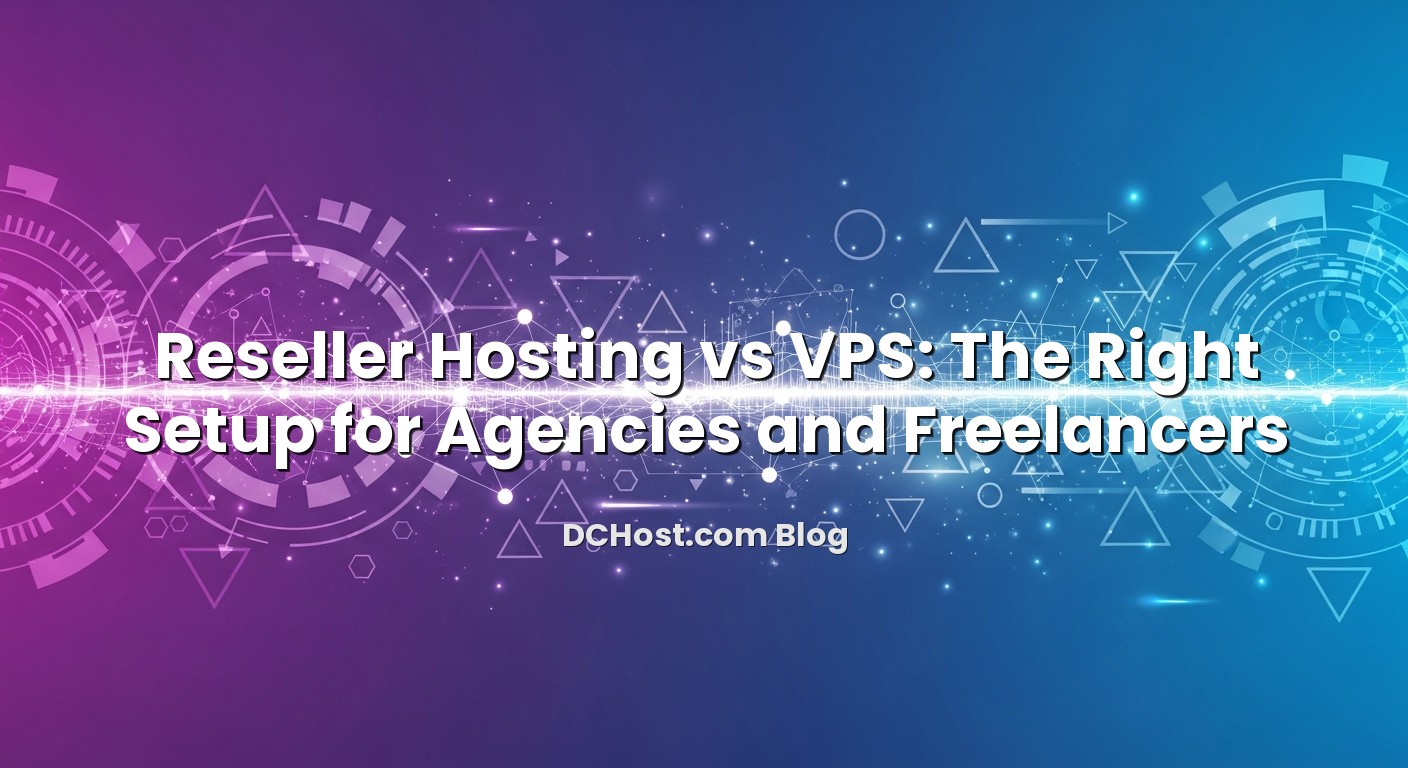If you run a web agency or work as a freelance developer, your hosting platform quietly decides how calm or chaotic your days feel. The same designs, the same codebase, and the same clients can feel completely different depending on whether you are on reseller hosting or a VPS. One setup lets you focus on design, UX, and copy while the infrastructure mostly takes care of itself. The other gives you full control over performance, security, and automation, but expects you to act like a small hosting provider or DevOps engineer. Choosing between reseller hosting and VPS is not about which is universally better, but which matches how you actually work, sell, support, and grow. In this article, we will look at reseller hosting vs VPS from the perspective of real agencies and freelancers: what you gain, what you lose, and how to design an upgrade path that does not interrupt client projects or sleep.
İçindekiler
- 1 Why Your Infrastructure Choice Matters More Than You Think
- 2 What Reseller Hosting Really Is (From an Agency Perspective)
- 3 What a VPS Is and Why Agencies End Up There
- 4 Reseller Hosting vs VPS: Key Differences That Actually Matter
- 5 Real-World Scenarios: When Reseller Hosting or VPS Makes Sense
- 6 Designing a Calm Upgrade Path: From Reseller Hosting to VPS
- 7 How to Choose Between Reseller Hosting and VPS at dchost.com
- 8 Wrapping Up: Find the Infrastructure That Matches How You Really Work
Why Your Infrastructure Choice Matters More Than You Think
Many agencies and freelancers start on whatever hosting their first client already uses. Over time, that turns into a pile of logins across different providers, inconsistent performance, and a lot of context switching whenever something breaks. At some point you ask a simple question: should I centralise my clients under a reseller hosting account, or run everything on my own VPS infrastructure?
This choice affects several things you probably care about:
- How much time you spend on server maintenance versus design, development, and strategy
- How much margin you can add on top of hosting when you resell it to clients
- How consistent performance and uptime feel across all client sites
- How easy migrations and upgrades are when a client suddenly grows
- How much control you have over software versions, caching, and security hardening
We already covered the broad hosting landscape in our article the friendly, real-world comparison of web hosting types. Here, we are going much deeper into the specific decision between reseller hosting and VPS for agencies and freelancers.
What Reseller Hosting Really Is (From an Agency Perspective)
Reseller hosting is basically shared hosting with an extra layer that lets you create and manage multiple separate hosting accounts under one master login. Each client gets their own panel (often cPanel or Plesk), their own FTP and email accounts, and their own resource limits, while you get a central dashboard to create, suspend, or modify these accounts.
How Reseller Hosting Works Technically
Under the hood, a reseller plan sits on a shared server managed by the hosting provider. The provider maintains the operating system, web server, database server, security patches, backups, monitoring, and usually the control panel. Your reseller account is allocated a pool of resources such as disk space, bandwidth, number of accounts, and sometimes CPU and RAM. You then carve those resources into smaller hosting packages and assign them to clients.
You are not managing the server itself. Instead, you are configuring and selling slices of a platform that dchost.com already manages for you.
Advantages of Reseller Hosting for Agencies and Freelancers
Reseller hosting is popular with design studios, WordPress agencies, and solo freelancers for good reasons:
- Low operational burden: The provider handles server security, kernel updates, hardware, and most platform-level issues.
- Simple onboarding: You can create a new client account in minutes with a pre-defined package and pre-installed applications.
- White-label potential: Many reseller setups allow you to hide the underlying provider, so clients see only your brand.
- Predictable pricing: One fixed reseller fee can cover dozens of low-traffic client sites.
- Familiar tools: If you or your clients know cPanel or Plesk, there is almost no learning curve.
This is ideal if your main value is creative work or strategic consulting, and you simply want a clean, centralised way to bundle hosting into your service offering.
Limitations of Reseller Hosting You Feel in Real Projects
Over time, certain constraints of reseller hosting become more visible, especially as clients grow:
- Limited server-level control: You cannot fine-tune PHP-FPM pools, change database configuration deeply, or install custom system packages.
- Shared resources: Even with fair resource limits, you share CPU, disk, and network with other resellers on the same server.
- Performance ceilings: High-traffic WooCommerce stores, heavy marketing funnels, or custom apps may hit platform limits quickly.
- Strict software versions: You rely on the provider’s schedule for PHP, MySQL, and OS upgrades.
- Limited automation: Complex deployment pipelines, custom Git workflows, or container-based setups are often not possible.
For many agencies, these limits are acceptable for standard brochure sites, basic blogs, and simple corporate pages. The friction appears when you start hosting even a handful of demanding ecommerce or application workloads.
What a VPS Is and Why Agencies End Up There
A VPS, or Virtual Private Server, is a virtual machine with dedicated resources and root access, running on powerful physical hardware in a data center. Instead of sharing a fixed, pre-configured environment, you get your own isolated system where you decide how the stack is installed, configured, and tuned.
How a VPS Works in Practice
On a VPS, you typically choose an operating system such as a Linux distribution. You then install and configure:
- The web server (for example Nginx or Apache)
- PHP-FPM or another application runtime
- Database servers such as MySQL, MariaDB, or PostgreSQL
- Caching layers such as Redis or Memcached
- Security components like firewalls and fail2ban
With root access, you can install almost any software the OS supports. You are closer to what a small hosting provider or DevOps engineer does, but this freedom is exactly what many agencies need once they host performance-sensitive or custom-coded projects. For a detailed look at how responsibilities shift, our article Managed vs Unmanaged VPS Hosting breaks down who does what on a VPS.
Advantages of a VPS for Agencies and Freelancers
Using one or more VPS servers gives you control and flexibility you simply cannot get on typical reseller plans:
- Full control over stack and versions: Choose your exact PHP versions, database engine, and web server settings.
- Stronger isolation: Your VPS resources are isolated from other customers at the hypervisor level.
- Custom performance tuning: Tune PHP-FPM, database buffers, caching, and OS parameters for your exact workloads.
- Advanced automation: Implement CI/CD, Git-based deployments, containers, or orchestration tools.
- Scalable architecture: You can split workloads across multiple VPS servers for web, database, cache, and background jobs.
This is the territory where our clients run serious WooCommerce stores, Laravel or Node.js apps, and SaaS projects with clear performance and uptime expectations.
Challenges and Responsibilities on a VPS
The freedom of a VPS also brings extra responsibility:
- Server management skill: Someone needs to be comfortable with Linux, firewalls, SSL, and backups.
- Security hardening: SSH, firewall rules, updates, and intrusion prevention fall under your playbook unless you choose a managed option.
- Monitoring and incident response: You should have alerting for disk space, CPU, RAM, response times, and errors.
- Capacity planning: You decide how many vCPUs, how much RAM, and how fast disk you need. Our guide how to choose VPS specs for WooCommerce, Laravel, and Node.js walks through this step.
The good news is that much of this is repeatable. Once you standardise a VPS image and a deployment playbook, new projects follow the same pattern with minimal extra cost per client.
Reseller Hosting vs VPS: Key Differences That Actually Matter
Now let us compare reseller hosting vs VPS in the dimensions that agencies and freelancers feel day to day: control, performance, management overhead, pricing, and client isolation.
Control and Customisation
- Reseller hosting: You get panel-level control. You can create accounts, adjust quotas, manage DNS zones, and enable features such as PHP versions per account, but you cannot change core server settings or install custom daemons.
- VPS: You control the entire stack. Need a specific PHP extension, a custom Nginx build, Node.js, or background queue workers? You can install and configure them as needed.
If your work is primarily classic sites and blogs on common CMS platforms, reseller control is usually enough. Once you regularly ship custom applications, background workers, or heavy API integrations, a VPS becomes much more attractive.
Performance, Isolation, and Resource Guarantees
Performance is not just about having more CPU; it is also about predictability and isolation.
- Reseller hosting: You share the physical server, including CPU, memory, and disk I/O, with many other resellers and their clients. Good providers set sensible per-account limits, but noisy neighbours are still a risk.
- VPS: Your VPS has its own dedicated slice of CPU, RAM, and storage at the hypervisor level. You choose the specs and can upgrade as your client base grows.
If you are curious about how modern storage like NVMe can boost site speed and reduce IO wait, our NVMe VPS hosting guide explains what actually changes under load.
Management Overhead and Skill Requirements
- Reseller hosting: Almost no server administration. You handle client onboarding, basic email and DNS questions, and first-line support. Anything deep or platform-level is escalated to the hosting provider.
- VPS: You (or your team) take responsibility for server setup, security hardening, updates, backups, and performance tuning, unless you choose a managed service option with clear responsibilities.
If you want to stay away from command lines and systemd units, reseller hosting is the calmer choice. If you enjoy infrastructure work or have a technical partner, a VPS opens many doors for automation, performance, and custom architectures.
Pricing, Margins, and Business Model
From a business perspective, reseller hosting and VPS support slightly different models.
- Reseller hosting: One monthly fee covers many low-traffic sites. You can package hosting into your maintenance plans with simple flat pricing per site. Margins are good when you have several small clients.
- VPS: You pay per server and per resource tier. It is easy to justify higher hosting fees to clients with serious performance or uptime needs, especially when you bundle in monitoring, backups, and SLAs.
Many agencies end up with a hybrid model: a reseller account for small, low-traffic sites with standard needs, and one or more VPS servers for high-value or resource-hungry projects.
Security and Client Separation
Security is less about which option is abstractly safer and more about how much control you have over protection layers.
- Reseller hosting: The provider maintains the OS, kernel, and panel security. You still need good practices such as strong passwords, separate accounts, and regular backups, but many deep measures are handled for you.
- VPS: You can apply advanced hardening: firewall rules, SSH key-only access, fail2ban, WAFs, and strict update policies. Our guide how to secure a VPS server without drama is a practical checklist for this.
For agencies building custom platforms, running payment integrations, or handling sensitive data, the ability to design and verify your own security posture on a VPS can be a strong advantage.
Real-World Scenarios: When Reseller Hosting or VPS Makes Sense
Instead of a theoretical checklist, let us map this to scenarios agencies and freelancers actually face.
Scenario 1: Solo Freelancer with 10–30 Small Business Sites
You build WordPress or similar CMS sites for local businesses: lawyers, dentists, boutique stores, consultants. Each site gets a few thousand visits per month, contact forms, and perhaps a simple blog. You want to:
- Bundle hosting and maintenance into a simple monthly fee
- Avoid spending hours on server patching or complex monitoring
- Provide clients with their own panel access for email and basic management
Best fit: A solid reseller hosting plan. You get centralised management, simple packaging, and minimal server admin. As long as you pick reasonable resource limits for each client and keep an eye on outliers, this can comfortably support dozens of such sites.
Scenario 2: Small Agency with WooCommerce and Campaign Sites
Your agency handles ecommerce stores, active blogs, and marketing campaigns that sometimes receive big spikes of traffic during ads or launches. You want to:
- Ensure fast page loads under load for core revenue-generating sites
- Tune PHP, database, and caching specifically for each high-traffic project
- Run staging and production environments with proper deployment flows
Best fit: A VPS (or a few VPS servers) for critical sites, optionally combined with a reseller plan for small, static clients. On the VPS side, our article canary deploys on a VPS with Nginx and safe rollbacks and related deployment guides show how to run proper staging and rollout processes.
Scenario 3: Technical Studio Shipping Custom Web Apps or SaaS
You and your team build Laravel or Node.js apps, custom APIs, or SaaS products. You often need:
- Background queues, schedulers, WebSockets, and modern deployment pipelines
- Separate database servers, caching layers, or file storage backends
- Fine-grained control over TLS, HTTP settings, and observability
Best fit: VPS as the primary platform. Reseller hosting does not typically support the kind of process supervision, queue runners, and custom networking these stacks require. You can still maintain a reseller account for tiny brochure sites, but your core apps will be happier on VPS infrastructure.
Scenario 4: Agency Wanting to Grow a Hosting Revenue Line
You already manage many client sites and realise that hosting is a stable, recurring revenue line you want to grow intentionally. You ask:
- Should we standardise on reseller hosting to simplify support?
- Should we create tiers where premium clients get a dedicated VPS?
- How do we migrate existing clients without downtime?
Best fit: A hybrid stack and a migration plan. Use reseller hosting for long-tail, low-traffic clients; use VPS plans for premium and performance-sensitive workloads. For migrations, our guide how to move from shared hosting to a VPS with zero downtime walks through practical DNS, backup, and cutover strategies that are directly applicable when moving from reseller accounts to VPS infrastructure.
Designing a Calm Upgrade Path: From Reseller Hosting to VPS
One of the biggest fears agencies have is that choosing reseller hosting first will lock them out of a VPS future. In practice, the healthiest path is often staged: start on reseller hosting, move selected clients to VPS when their needs justify it, and standardise the process.
Signals That It Is Time to Move a Client to VPS
Look for these signs in your monitoring or support queue:
- Frequent performance complaints even after optimising the site itself
- Resource limit issues such as CPU or entry process limits in cPanel
- Complex applications needing custom PHP modules or background workers
- Security or compliance requirements beyond what a shared environment provides
- Clear revenue impact if the site slows down or goes offline
When a client hits these criteria, moving them to a tuned VPS environment is usually straightforward and easy to justify commercially.
Steps to Migrate a Site from Reseller Hosting to VPS Smoothly
A calm migration usually follows this pattern:
- Prepare the VPS: Install the stack (web server, PHP, database, cache), harden security, and configure backups.
- Clone the site: Copy files and databases from the reseller account to the VPS, ideally using tools or scripts you standardise across projects.
- Test under a staging domain: Validate application behaviour, SSL, cron jobs, and email sending on the VPS.
- Plan DNS changes: Lower TTLs ahead of time so that the cutover propagates quickly.
- Perform final sync and switch DNS: Do a last-minute database sync, then point DNS to the VPS, monitoring logs and metrics.
If you want to go deeper on DNS and TTL strategies for zero downtime moves, the article TTL strategies for zero-downtime migrations provides a solid step-by-step playbook.
How to Choose Between Reseller Hosting and VPS at dchost.com
At dchost.com, we see the same pattern repeatedly with agencies and freelancers. The most successful teams do not treat reseller hosting vs VPS as a once-in-a-lifetime fork in the road, but as two complementary tools in the same toolbox.
Here is a simple way to frame your decision:
- Prioritise reseller hosting if you want minimal server management, host mostly low-traffic sites, and care about straightforward, predictable maintenance plans.
- Prioritise VPS if you build or host performance-critical stores and apps, want full control over stack and security, or plan to standardise DevOps practices across projects.
- Use a hybrid model if your client base is diverse: small marketing sites, busy blogs, WooCommerce stores, and custom apps living side by side.
Once you are clear on your portfolio and growth plans, it is easy to map them to a mix of dchost.com reseller hosting and VPS plans that fits both your technical comfort and your commercial goals.
Wrapping Up: Find the Infrastructure That Matches How You Really Work
Reseller hosting vs VPS is not about proving that one is objectively better. It is about aligning your infrastructure with the way your agency or freelance business actually operates. Reseller hosting keeps things calm and centralised when you mainly deliver design and content on standard CMS platforms. VPS hosting opens up a world of control, performance tuning, and automation once you host the kind of sites and apps where milliseconds and custom architectures matter.
The nice part is that you do not have to choose only once. Many of the most effective teams we work with keep a clean reseller environment for long-tail clients and one or more carefully tuned VPS servers for critical projects. As your portfolio and skills evolve, we can help you adjust that balance, migrate key sites without downtime, and standardise your stack so each new project is easier than the last.
If you want to talk through your specific mix of brochure sites, ecommerce, and custom apps, the dchost.com team is happy to help you map them to the right combination of reseller hosting and VPS infrastructure, and design a calm, realistic upgrade path that grows with your agency or freelance practice.





